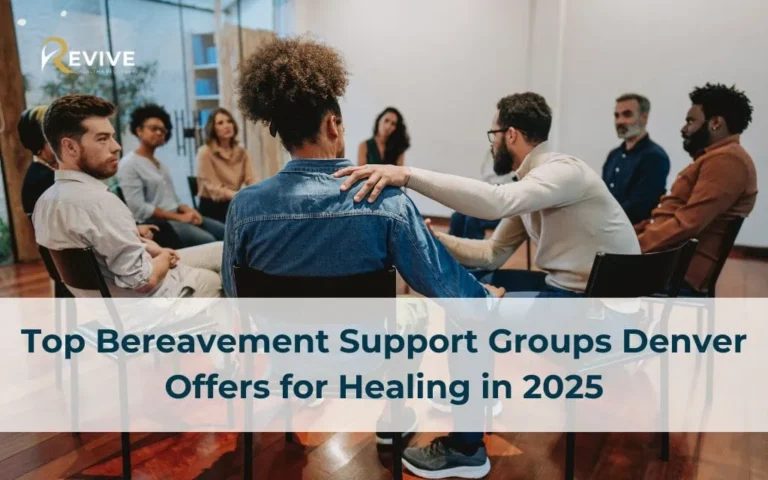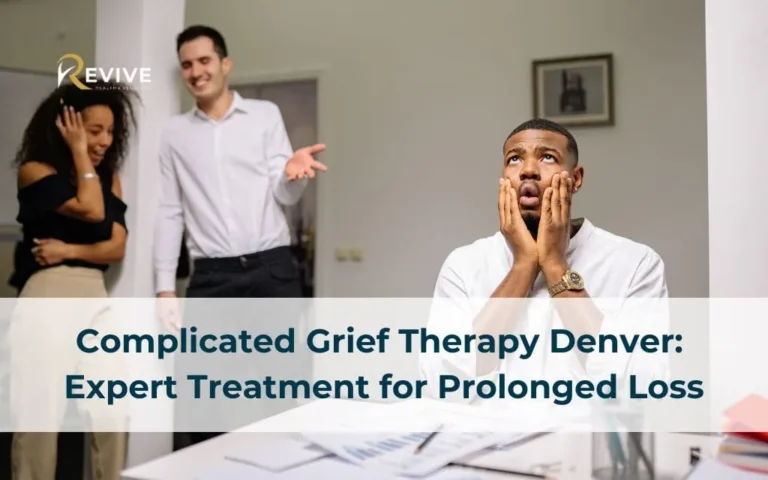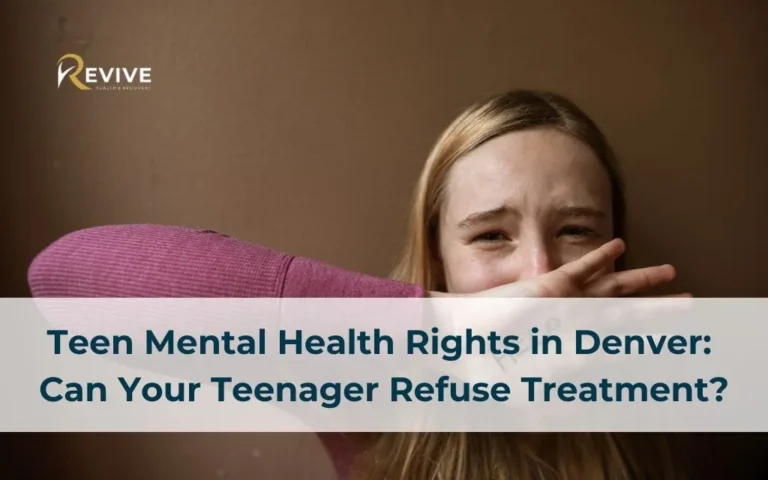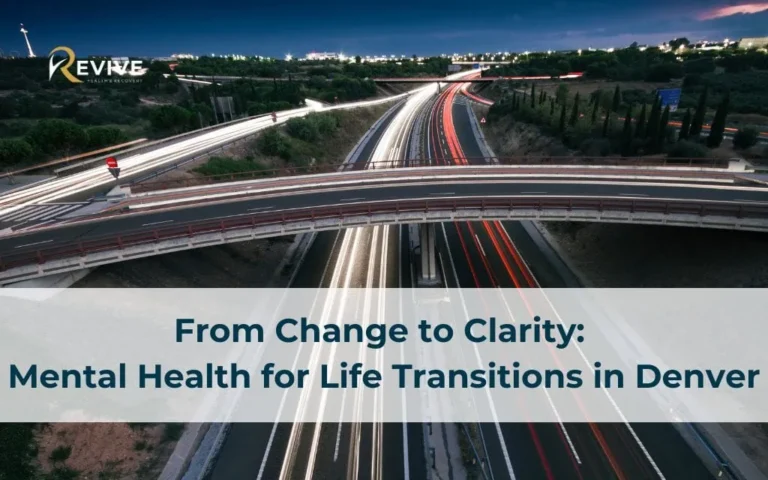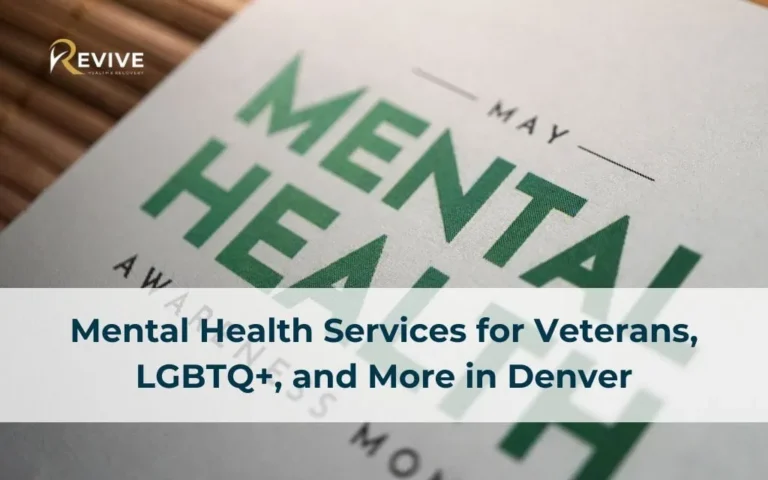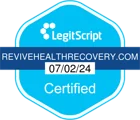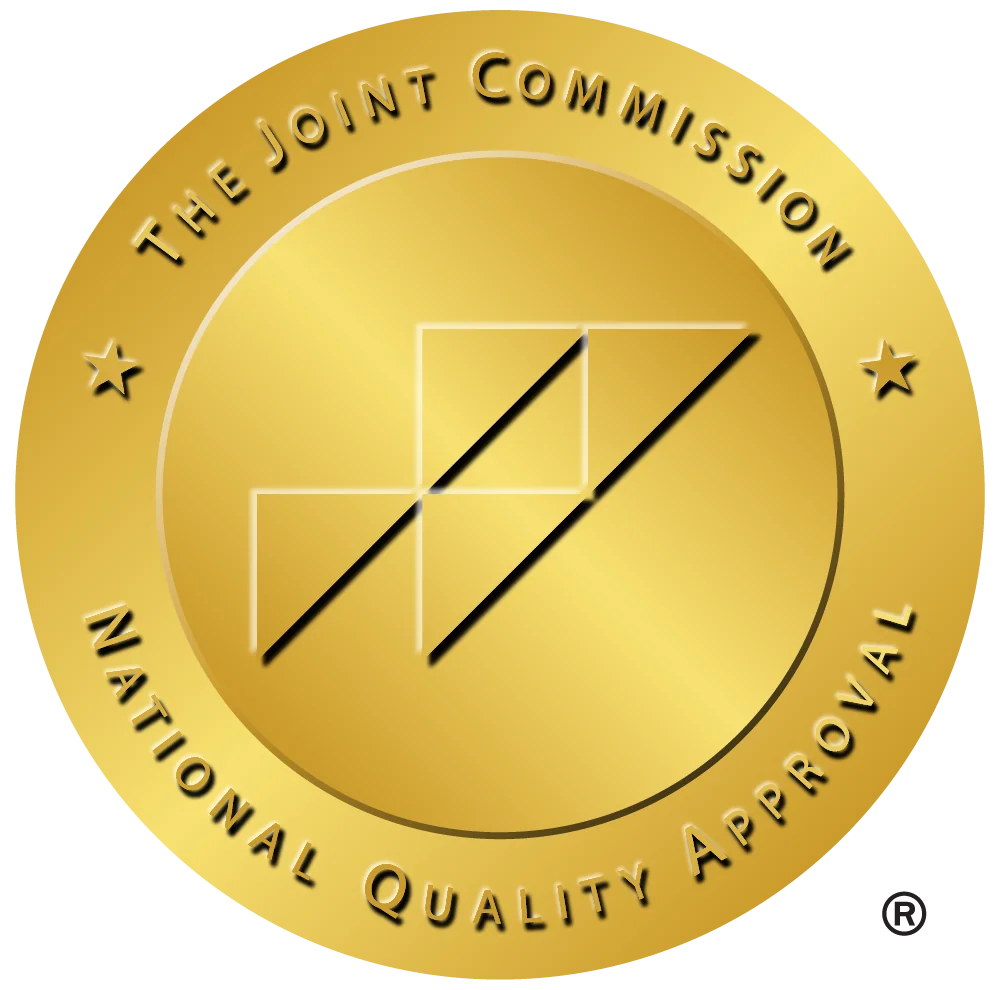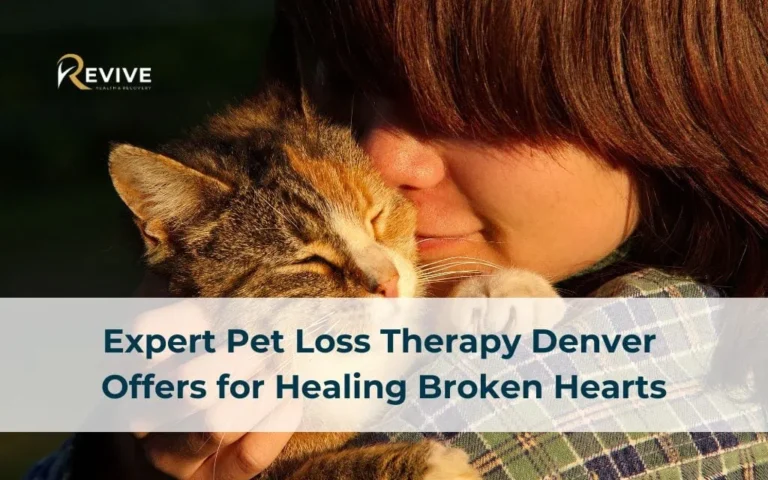
Mental Health Treatment: Signs, Types, What You Need to Know and More
Mental health treatment is essential for managing conditions that affect mood, behavior, and overall well-being. Recognizing the signs of when treatment is needed, understanding the different treatment types, and knowing where to start are all crucial steps in achieving a healthier, more balanced life. In this guide, Revive Health Recovery will explore the key symptoms, types of mental health treatment available, and practical tips to help you or a loved one find the support needed.

What is Mental Health Treatment?
Mental Health Treatment: The Basics of Mental Health
Finding the definition of Mental Health
Mental health is essential for our emotional, psychological, and social well-being. It affects how we think, feel, and act, influencing how we handle stress, connect with others, and make choices. Just like physical health, mental health is important for everyone, from children to adults, helping us cope with challenges and enjoy a balanced life.
Mental health treatment helps maintain this balance. Conditions like anxiety, depression, and bipolar disorder can disrupt daily life and affect those around us. Effective treatments—such as therapy, medication, or lifestyle changes—help people manage symptoms, rebuild confidence, and improve overall functioning.
Untreated mental health conditions can also impact physical health, raising the risk of heart disease, diabetes, and stroke. Treatment breaks this cycle, benefiting both mind and body for long-term health. Focusing on mental health is an investment in a happier, healthier life for everyone.

Understanding What is Mental Illness
Mental illnesses are complex conditions that affect thoughts, emotions, and behaviors, often disrupting daily life and relationships. They range from mild conditions like anxiety and depression to more severe disorders like schizophrenia and bipolar disorder. These illnesses can create challenges in personal life, work, and overall functioning.
It’s important to understand the difference between poor mental health and mental illness. Poor mental health refers to temporary struggles with stress or emotions, without a specific diagnosis. Mental illness, on the other hand, involves identifiable symptoms recognized by professionals and often requires treatment. However, even those with mental illness can experience periods of stability and well-being.
The Role of Mental Health Treatment in Managing Mental Illness
Mental health treatment is essential for reducing mental illness symptoms. It may involve therapy, medication, lifestyle changes, or a combination, customized to each person’s needs. For example, cognitive behavioral therapy (CBT) helps reframe negative thoughts, while medications like antipsychotics are useful for conditions like schizophrenia.
Treatment not only eases symptoms but also empowers individuals, helping them regain control and improve quality of life. Effective mental health care provides tools to manage stress, build resilience, and strengthen relationships, allowing people to reach their full potential.
Signs It May Be Time for Mental Health Treatment
Recognizing Signs That Someone May Need Support
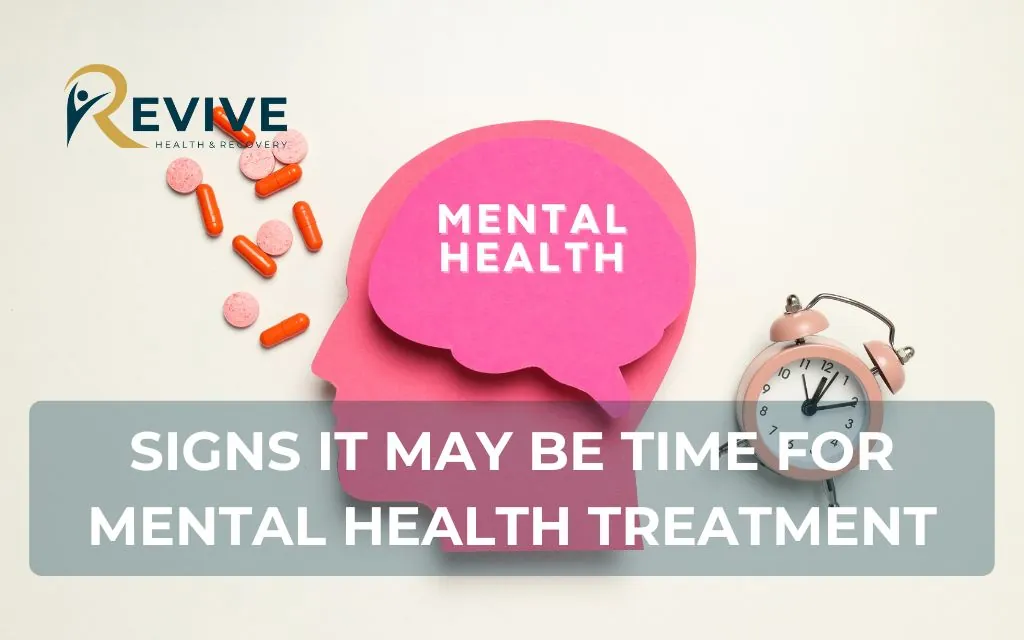
Identifying symptoms that indicate someone may need mental health treatment ensures they receive the right help. Here are key signs:
- Persistent Sadness or Anxiety: Ongoing feelings of sadness or anxiety that disrupt daily life may indicate conditions like depression or generalized anxiety disorder.
- Changes in Behavior or Mood: Sudden mood swings, irritability, or social withdrawal may suggest underlying mental health concerns.
- Difficulty Coping with Daily Stressors: Struggling to manage everyday challenges can signal the need for mental health treatment to develop effective coping skills.
- Changes in Sleep or Appetite: Alterations in sleep, appetite, or energy levels, such as insomnia or excessive sleep, may indicate mental health issues.
- Substance Abuse: Relying on alcohol or drugs to manage emotions can suggest deeper mental health issues needing treatment.
- Suicidal Thoughts or Behaviors: Any mention of suicidal thoughts requires immediate intervention and mental health support.
Why Mental Health Treatment Matters
Without appropriate treatment, mental illnesses can escalate, leading to complications that impact both mental and physical health. For example, untreated depression can increase the risk of chronic physical conditions like heart disease or diabetes, and anxiety can heighten stress levels, affecting the immune system. This connection underscores the importance of comprehensive mental health treatment, not only to address symptoms but to foster overall health.
Ultimately, mental health treatment plays an essential role in helping individuals live meaningful, balanced lives. It reinforces the idea that with the right support, people can manage their conditions effectively and experience periods of stability, well-being, and fulfillment.
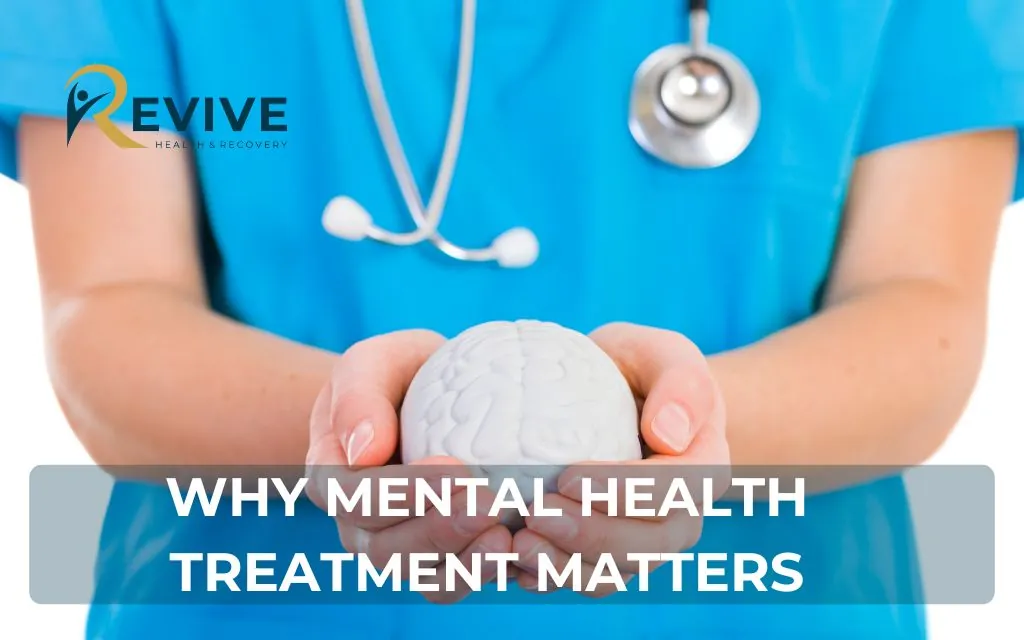
The Importance of Seeking Mental Health Treatment
Seeking mental health treatment is essential for individuals experiencing persistent symptoms. Ignoring or dismissing mental health issues can lead to worsening conditions, affecting not only emotional well-being but also relationships, work performance, and physical health. Early intervention through mental health treatment can help individuals manage symptoms, regain control, and improve overall quality of life, fostering healthier relationships and a more fulfilling life experience.
Benefits of Mental Health Treatment
Seeking mental health treatment offers numerous benefits that can improve overall quality of life:
- Enhanced Quality of Life: Addressing mental health concerns through treatment can lead to improved emotional well-being, stronger relationships, and greater satisfaction in various life areas.
- Strengthened Coping Skills: Mental health treatment provides individuals with coping strategies to manage stress, face challenges, and build resilience. Effective coping skills empower individuals to navigate life’s ups and downs more successfully.
Mental health treatment plays a critical role in supporting individuals through challenging times and enhancing overall well-being. Recognizing these symptoms early can help ensure timely intervention and a path toward a healthier, more balanced life.
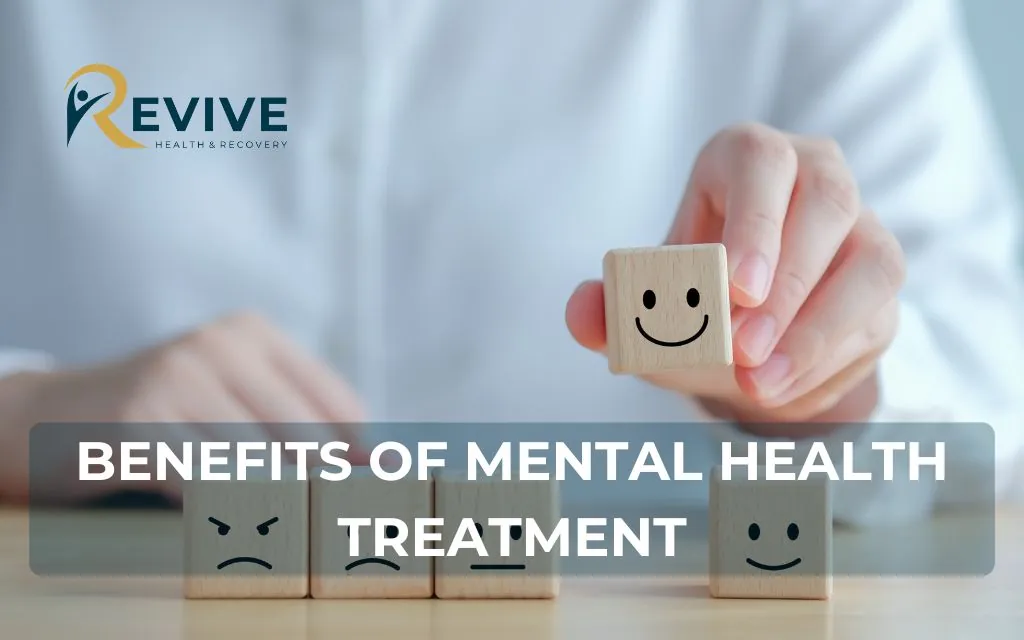
Different Types of Mental Health Treatment
For individuals living with mental health disorders, there are various treatment options available that aim to control symptoms, improve comfort with the diagnosis, and foster a deeper understanding of the condition. With guidance from a physician specializing in specific mental health conditions, patients can access customized treatment plans to address their needs. Mental health treatment options include:
- Medication: Many mental health disorders respond well to medications such as antidepressants and psychotropics, which adjust brain chemistry to lessen symptom severity. It’s essential to follow the prescribed regimen closely and consult a doctor before making any changes or discontinuing medication.
- Psychotherapy: Talking with a mental health professional can help individuals cope with the challenges of chronic mental health conditions. Psychotherapy, which may be conducted individually or in groups, includes methods like Cognitive Behavioral Therapy (CBT), focusing on reshaping thought patterns and behaviors for healthier outcomes.
- Alternative Treatments: Complementary therapies such as herbal supplements, yoga, acupuncture, massage, and meditation can be beneficial in managing mental health symptoms like depression. However, it’s recommended to consult a doctor before starting any herbal or alternative treatments to prevent interactions with other medications.
- Neurostimulation Treatments: In cases where medication alone isn’t enough, neurostimulation therapies can help by directly influencing brain activity. Treatments such as Transcranial Magnetic Stimulation (TMS) and Electroconvulsive Therapy (ECT) alter nerve responses and brain cell function, making them effective for severe cases.
Each mental health condition requires a tailored approach, and with the right combination of these treatments, individuals can find relief and work toward improved mental wellness.
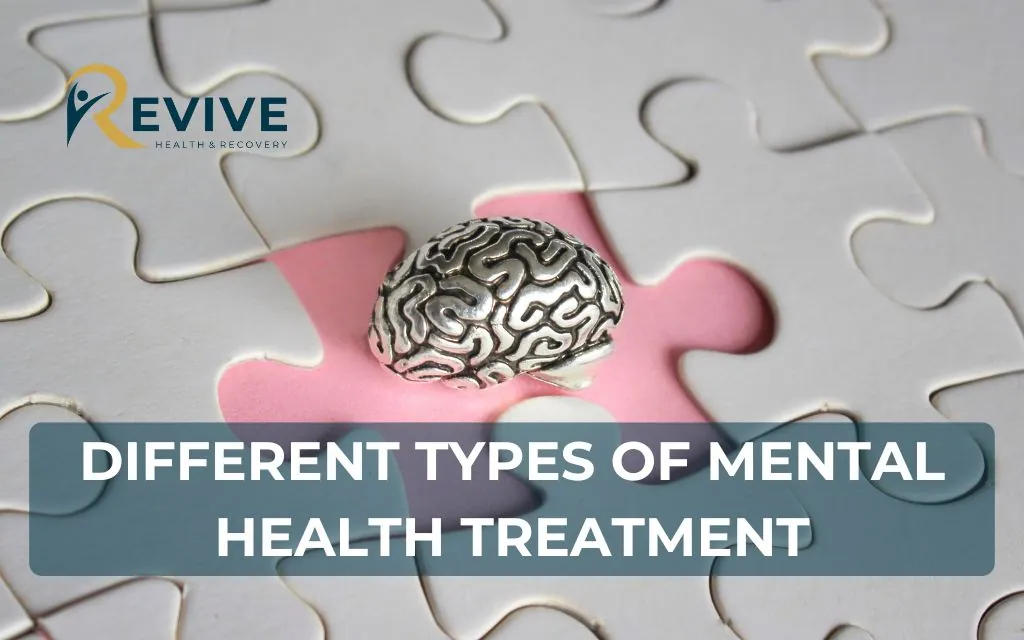
What is Outpatient Mental Health Treatment in Colorado?
Outpatient mental health treatment in Colorado refers to a flexible, non-residential form of treatment where individuals receive support in clinical settings like offices or hospitals without staying overnight. Unlike inpatient care, outpatient programs allow patients to return home each evening, making it a suitable option for those who need ongoing support but can manage daily activities independently.
Outpatient mental health treatment is customized based on each individual’s specific needs and the severity of their condition. This personalized approach may include:
- Individual or group counseling
- Psychotherapy sessions
- Medication management by a psychiatrist
- Dialectical behavior therapy (DBT)
- Treatment for chemical dependency
- Specialized programs like bipolar disorder and anxiety treatments
- Depression-focused therapies
- Transcranial Magnetic Stimulation (TMS)
- Stress management skills training
- Family therapy sessions
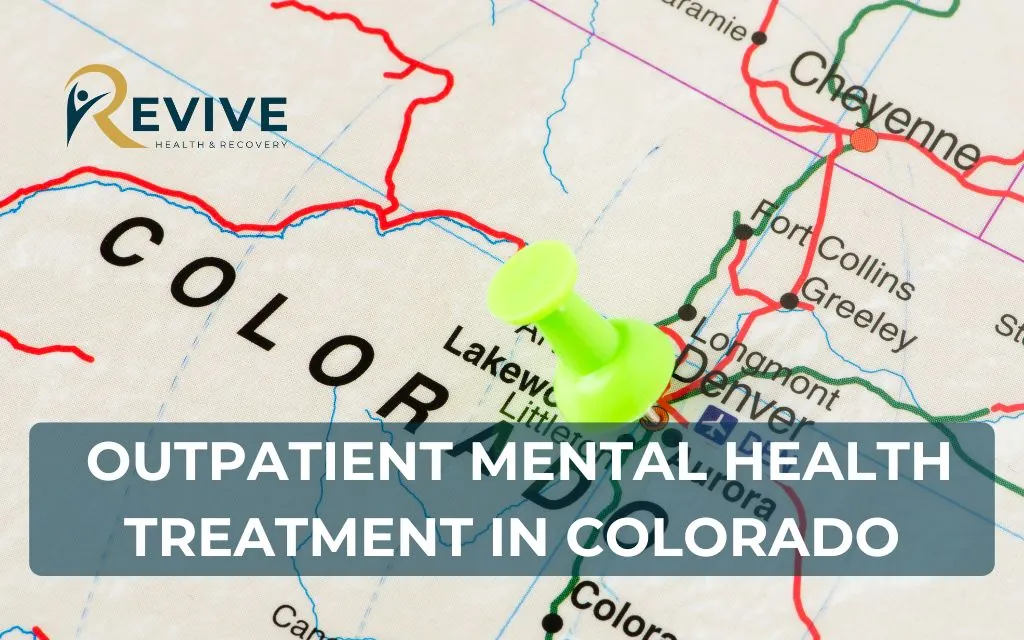
The level of care in outpatient programs varies widely, from a few hours per week to intensive programs offering six or more hours of treatment daily. Each outpatient program begins with a comprehensive evaluation to determine the best course of treatment tailored to the individual’s mental health goals and lifestyle. This flexible structure allows people to get the support they need to improve their mental well-being while maintaining daily routines.
What is Inpatient Mental Health Treatment in Colorado?
Inpatient mental health treatment involves a short-term stay in a psychiatric hospital, where a team of mental health professionals closely monitors symptoms and provides comprehensive care. This type of treatment is available across psychiatric units, typically within general hospitals. The most common inpatient stay lasts around two weeks, during which patients receive focused mental health support to stabilize symptoms, allowing them to transition to less intensive care once improvements are made.
Preparing for Mental Health Treatment
Tips for Getting the Most Out of Mental Health Treatment
- Find a Therapist Who’s a Great Fit – Your connection with your therapist is essential, so choose someone you feel comfortable with.
- Understand Their Approach – Learn about their methods to see if it aligns with your goals and needs.
- Handle Practicalities First – Take care of logistics like payments and scheduling to focus fully on therapy.
- Prepare a List of Topics – Jot down things you’d like to discuss to ensure you cover what matters most.
- Schedule Down Time Before and After – Give yourself time to process thoughts before and after each session.
- Ensure a Quiet Space for Online Therapy – If you’re meeting online, find a calm, private space for undistracted sessions.
- Stay Consistent – Regular attendance is key to building progress and achieving results.
- Share Feelings, Not Just Facts – Be honest about your emotions for deeper insights.
- Remember Your Therapist Isn’t Your Friend – Maintaining a professional relationship helps you stay objective and focused.
- Step Out of Your Comfort Zone – Growth often requires pushing boundaries and trying new strategies.
- Set Specific Goals Together – Collaborate with your therapist on measurable, actionable goals.
- Don’t Expect Direct Advice – Therapists guide you but don’t make decisions for you.
- Bring a Journal – Note thoughts, breakthroughs, or questions to revisit in sessions.
- Check-In on Progress Regularly – Set up routine assessments with your therapist to track growth.
- Track Changes Over Time – Reflect on improvements and challenges to stay motivated.
- Allow Time for Self-Care and Homework – Use time between sessions to practice skills and self-care.
- Communicate What’s Not Working – Be open about concerns with your therapist to adjust the approach if needed.
- Ask Loved Ones for Support – Lean on family and friends for encouragement.
- Be Patient – Change takes time, so allow yourself to progress gradually.
- Enjoy the Process – Embrace each step as part of your journey toward wellness.
- Leave Bad Therapy Relationships – If it’s not helping, don’t hesitate to seek a better fit.
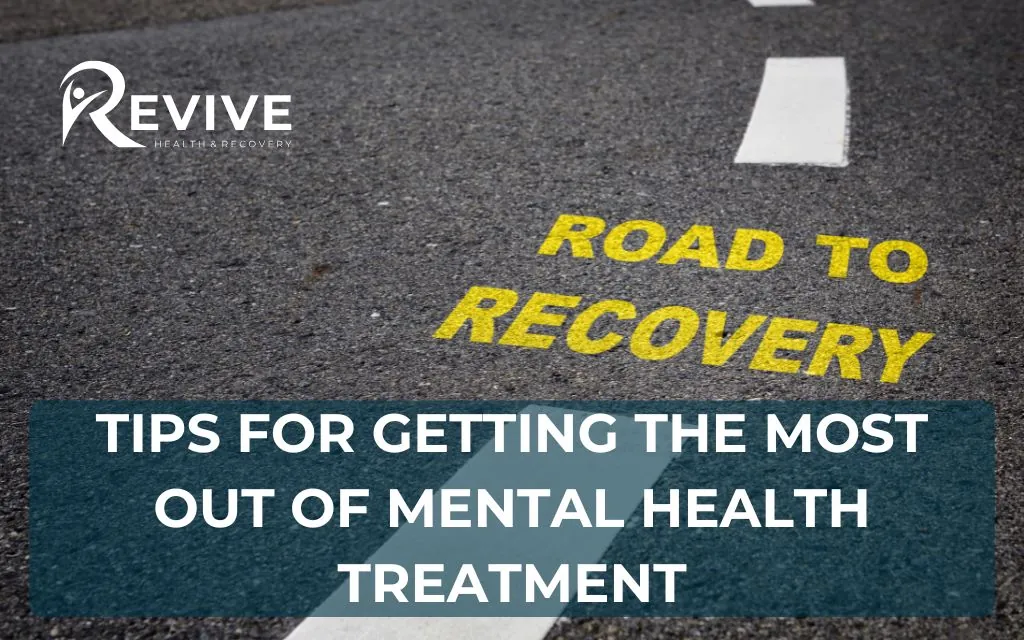
Following these tips can help you maximize your mental health treatment, building a more effective and meaningful experience.
How to Find a Mental Health Professional
Finding the right mental health professional can be crucial for effective treatment. Here are some steps to help locate and choose a therapist:
Where to Look:
- Psychologist Locator: A directory for finding licensed psychologists in your area.
- National Register: Provides information on verified mental health professionals.
- State Psychological Association: Contacting your state’s association can yield a list of therapists nearby.
Important Factors to Consider:
- Therapist License: Ensure the therapist has a valid state license, indicating they have the necessary training and are qualified to provide quality care.
- Health Insurance: Check if your health insurance plan covers the therapist you’re considering. This can help lower out-of-pocket costs.
- Number of Covered Sessions: Be aware of any limits on the number of therapy sessions your insurance covers to plan accordingly.
By using these resources and considering these factors, you can find a qualified mental health professional who fits your needs.
How to Find a Mental Health Treatment Center
Finding the right mental health treatment center can be overwhelming, especially when you or a loved one requires a more intensive level of care. Here’s a breakdown of key factors to consider to help guide your search:
Determine the Appropriate Level of Care
Understanding which level of care is needed can be challenging. Many individuals begin with outpatient treatment (seeing a therapist or psychiatrist monthly), which is often effective for conditions like depression, anxiety, or PTSD. However, if outpatient care isn’t managing symptoms, it may be time to explore more intensive options:
- Intensive Outpatient Programs (IOP): These programs often meet several times per week, providing structured support without requiring an overnight stay.
- Partial Hospital Programs (PHP): Typically held daily, PHPs offer comprehensive care without full hospitalization.
- Residential Treatment: For those needing constant care, residential facilities provide on-site living arrangements with 24/7 support.
The decision to seek a higher level of care often comes after a hospital discharge or when symptoms persist despite outpatient efforts.
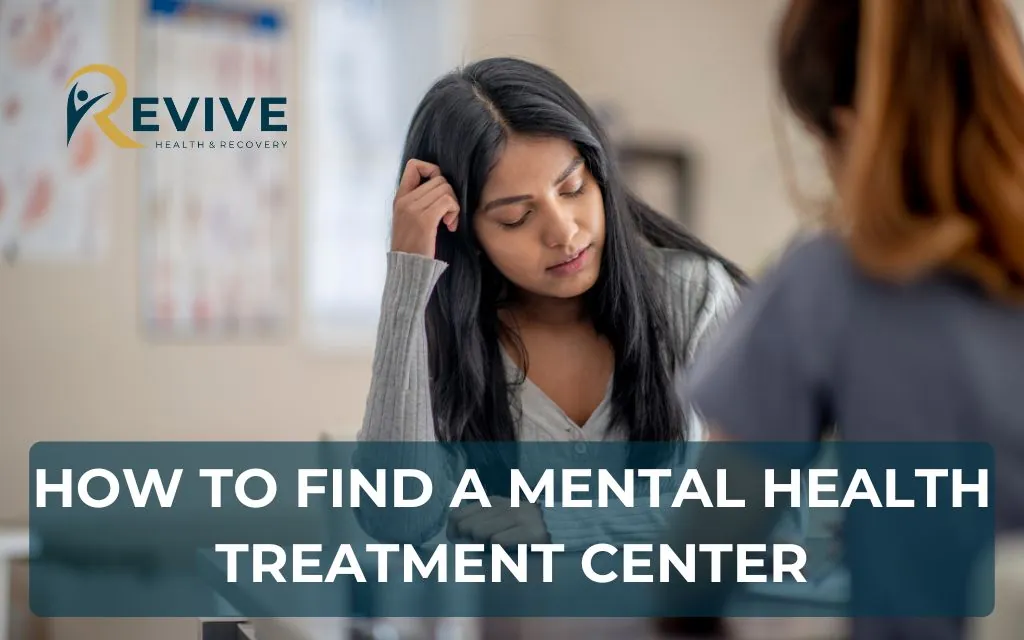
Evaluate Clinician Qualifications
Quality mental health treatment requires qualified clinicians. Look for programs with licensed mental health professionals, ideally with advanced degrees (master’s level or higher). A psychiatrist should be on staff to handle medication management and ensure individualized care. Clinicians should also have expertise in evidence-based treatments like Acceptance and Commitment Therapy (ACT) and therapies targeting trauma, mood disorders, and personality disorders.
Look for Comprehensive and Thoughtful Programming
A reputable treatment program should start with a biopsychosocial evaluation by a board-certified psychiatrist or licensed therapist. This initial assessment informs the treatment plan, which should be evidence-based and tailored to the individual’s needs. Key components of thoughtful programming include:
- Clearly defined treatment goals and measurable progress indicators.
- A collaborative approach, sharing the treatment plan with the client and adjusting it as needed.
- Discharge planning that includes supportive next steps to help clients maintain progress after leaving the facility.
Ask Questions and Research Thoroughly
Choosing a mental health treatment center is a critical step, often during stressful times. Don’t hesitate to ask detailed questions about the center’s services, transparency, and support. A reliable treatment center will provide clear information, address any concerns, and foster a collaborative relationship to ensure clients feel comfortable and supported.
The right treatment center can make a significant difference, providing immersive treatment, supportive living, and a therapeutic environment tailored to meet individual needs. By carefully evaluating these factors, you can find a mental health treatment center that aligns with your specific goals and needs.
Why Don’t People Get Mental Health Treatment? Key Reasons Explained
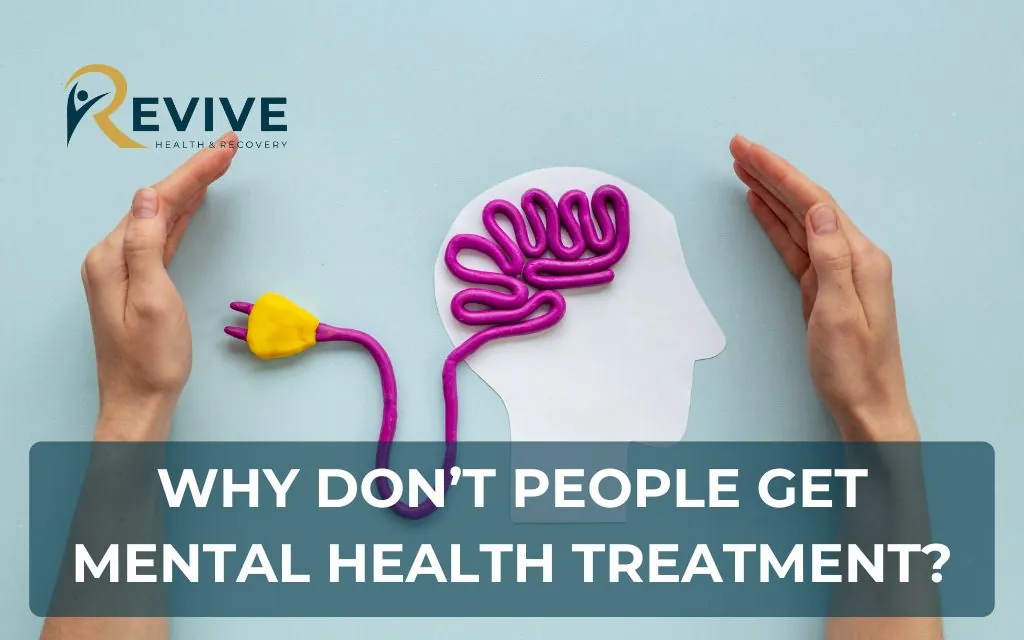
Fear and Shame
Many avoid treatment due to the stigma associated with mental illness, fearing labels like “mentally ill” or “crazy.” Concerns over potential career or social repercussions can also play a role.
Lack of Insight
Some individuals, especially those with severe mental illnesses like schizophrenia, genuinely believe they don’t need help. This lack of awareness, called anosognosia, leads them to deny the presence of any problem.
Limited Awareness
Even when acknowledging certain symptoms, some may downplay them, thinking “it’s not that bad” or “everyone gets stressed.” This minimization prevents them from realizing the need for treatment.
Feelings of Inadequacy
The belief that seeking help is a sign of weakness stops many from accessing treatment. They may feel they “should be able to handle things” independently, fearing judgment for asking for support.
Distrust
Trust issues with healthcare professionals also prevent people from seeking treatment. Worries about confidentiality or discomfort with sharing personal issues with a stranger add to this hesitancy.
Hopelessness
Feelings of despair, common with mental illnesses, lead some to believe “nothing will help” or “I’ll never get better.” This sense of hopelessness creates a barrier to treatment.
Unavailability
Lack of mental health professionals, particularly in underserved areas, leaves some without access to necessary care. This shortage is even more critical for complex conditions requiring specialized treatment.
Practical Barriers
Financial hardship, lack of insurance, transportation issues, and scheduling conflicts often prevent individuals from pursuing mental health treatment, even if they recognize the need.
Each of these barriers reveals why many individuals with mental health issues remain untreated, emphasizing the importance of addressing these obstacles to make mental health care more accessible.
Conclusion
Mental health treatment is a powerful tool for improving quality of life, offering individuals the resources and support to manage their mental well-being. By recognizing the signs that treatment may be necessary and exploring options like outpatient and inpatient care, psychotherapy, and lifestyle adjustments, anyone can take steps toward recovery and resilience.
Whether you’re seeking help for yourself or supporting someone else, understanding the types of treatment available and the steps to begin can make a meaningful difference on the journey to mental wellness.

